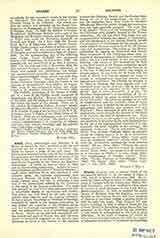

Allatius (ALACCI), Leo, a learned Greek of the seventeenth century, b. on the island of Chios in 1586, and d. at Rome, January 19, 1669. He entered the Greek college at Rome in 1600, spent three years in Lucania with his countryman, Bishop Bernard Giustiniani, and then returned to Chios where he proved of great assistance to the Latin Bishop, Marco Giustiniani. In 1616, he received the degree Doctor of Medicine from the Sapienza, was made Scriptor in the Vatican library, and, later, professor of rhetoric at the Greek College, a position which he held for only two years. Pope Gregory XV sent him to Germany, in 1622, to bring to Rome the Palatinate library of Heidelberg, which Maximilian had presented to the Pope in return for war subsidies, a task which he accomplished in the face of great difficulties. In the death of Gregory XV (1623) Allatius lost his principal patron; but with the support of influential churchmen, he continued his researches, especially upon the Palatinate manuscripts. Alexander VII made him custodian of the Vatican library in 1661, where he remained till his death. With untiring energy Allatius combined a vast erudition, which he brought to bear upon literary, historical, philosophical, and theological questions. He labored earnestly to effect the reconciliation of the Greek Church with that of Rome and to this end wrote his most important work, “De Ecclesiae Occidentalis atque Orientalis perpetua consensione” (Cologne, 1648), in which the points of agreement between the Churches are emphasized, while their differences are minimized. He also edited or translated into Latin the writings of various Greek authors, corresponded with the foremost scholars of Europe, contributed as editor to the “Corpus Byzantinorum” (Paris), and arranged for the publication of a “Bibliotheca Scriptorum Graecorum”. He bequeathed his manuscripts (about 150 volumes) and his correspondence (over 1,000 letters) to the library of the Oratorians in Rome.
FRANCIS W. GREY

